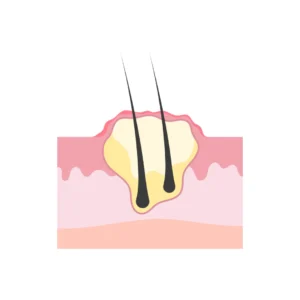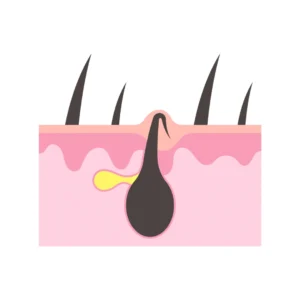Understanding Folliculitis


Types of Folliculitis
The most common type of Folliculitis is superficial, however in severe cases it may be deeper into the entire hair follicle.
- Superficial Folliculitis: The most common form, affecting just the upper part of the hair follicle. It manifests as small, white-headed pimples around hair follicles, characterized by irritation and sometimes pus-filled bumps.
- Deep Folliculitis: A more severe form, affecting the entire hair follicle. This can lead to larger, swollen bumps that can be painful and tender.
Symptom Check
- Clusters of small red bumps or white headed pimples that develop around hair follicles
- Pus-filled blisters, that break open and dry over
- Irritable, burn like sensation on clustered area
- Painful, tender skin
- Large swollen bumps
What can we do to help?
As a medical skin care provider, we offer a full complimentary initial skin analysis with our medical skin experts to begin your skin health journey. We will assess, diagnose, treat and prescribe you through your bespoke skin journey treatment plan, as well as reviewing your skin concerns progress. A combination of in clinic treatments and at home products are used to treat Follicultis. In Clinics treatments include Bespoke Facial Treatment in-cooperating our Obagi Blue Radiance Peel to treat the concerned area.
As well as building your bespoke treatment plan in clinic. We also have our FTT Expert Skin Prescription Service to prescribe you with the right skin medication in more severe diagnoses cases. Our service offers prescriptions such as a variety of Tretinoin percentages, Obagi Pore Therapy and Obagi Nu-Derm System. Your at home treatment plan is the basis for great skin health and success.
At Home Care for Folliculitis
In addition to professional treatments, managing folliculitis at home is crucial. Our FTT Expert Skin Prescription Service can prescribe effective medications, including Tretinoin and the Obagi Pore Therapy system, to complement your in-clinic treatments.
FAQs on Folliculitis
Can folliculitis go away on its own?
Mild cases of folliculitis can resolve without treatment, but persistent or severe cases require medical intervention to prevent complications.
Is folliculitis contagious?
Folliculitis caused by a bacterial infection can be contagious, especially if someone comes into direct contact with the infected area.
Can shaving cause folliculitis?
Improper shaving techniques can lead to folliculitis by causing ingrown hairs. Using a clean razor and following the direction of hair growth can help prevent this.
Are there any lifestyle changes that can help with folliculitis?
Maintaining good personal hygiene, wearing loose-fitting clothes, and using non-comedogenic skincare products can help manage and prevent folliculitis.
How long does treatment for folliculitis take?
The duration of treatment varies depending on the severity of the condition and the individual’s response to therapy. Consistency and adherence to the treatment plan are key.
What triggers folliculitis?
Folliculitis can be triggered by a bacterial infection, especially from the Staphylococcus aureus bacteria. Wearing tight clothing that irritates the skin can also lead to folliculitis by trapping sweat and bacteria against the skin.
Can hot tubs cause folliculitis?
Yes, improperly maintained hot tubs can lead to a specific type of folliculitis known as hot tub folliculitis or Pseudomonas folliculitis. This condition is caused by the Pseudomonas bacteria found in warm, chlorinated water, leading to a widespread outbreak of folliculitis among users.
Is folliculitis only caused by shaving?
While shaving is a common cause, folliculitis can also result from friction, blockages from skin products, or specific diseases that affect the hair follicles. Using a dull razor or shaving without proper lubrication increases the risk of developing shaving-induced folliculitis.
Can diet affect folliculitis?
There’s no direct link between diet and folliculitis, but a healthy diet can improve overall skin health. Foods high in sugars and fats can trigger inflammation in the body, potentially worsening the symptoms of folliculitis.
How can I differentiate between folliculitis and acne?
Folliculitis is characterized by red, inflamed bumps around hair follicles, often with a hair in the center of the bump, whereas acne can occur anywhere on the skin and is not necessarily centered around hair follicles. Acne involves the sebaceous glands and can include blackheads and cysts, which are not typical of folliculitis.
Is it safe to pop folliculitis bumps?
Popping or squeezing folliculitis bumps can spread the infection and lead to scarring. Treatment should focus on reducing inflammation and treating the infection, not mechanical extraction.
Can stress cause folliculitis?
Stress itself does not cause folliculitis, but it can exacerbate existing skin conditions and weaken the immune system, making the skin more susceptible to infections. Managing stress levels through relaxation techniques and adequate sleep can help in the overall treatment of skin conditions like folliculitis.
Does folliculitis scar?
Severe or improperly treated folliculitis can lead to scarring or permanent hair loss in the affected area. Early and appropriate treatment of folliculitis can minimize the risk of scarring.
Can children get folliculitis?
Yes, children can develop folliculitis, often as a result of irritation from clothing or after spending time in a hot tub. Children with weakened immune systems or those who engage in sports with shared equipment may have a higher risk of developing folliculitis.
How long does folliculitis last?
The duration of folliculitis can vary. Mild cases may resolve in a few days with proper hygiene and care, while chronic or severe cases may require weeks of treatment. Consistent treatment and prevention strategies are key to managing folliculitis effectively.
Conclusion
Folliculitis, while not harmful, can be a source of discomfort and affect one’s quality of life. At FTT Skin Clinics, we provide effective solutions to manage and treat folliculitis, ensuring our patients achieve the best possible skin health. If you’re struggling with folliculitis, remember, you’re not alone, and treatment is available.


